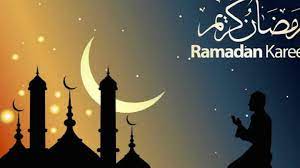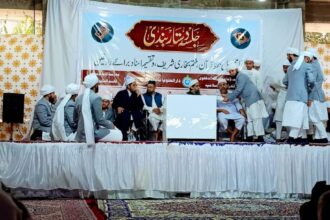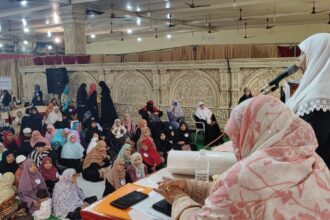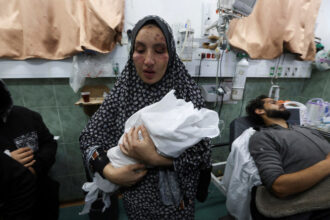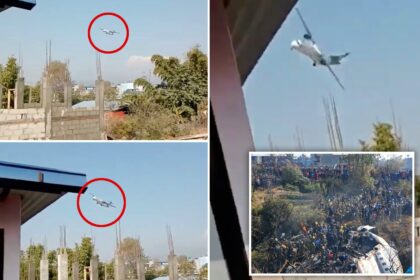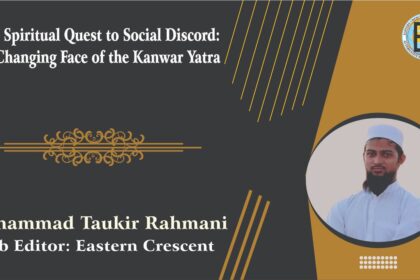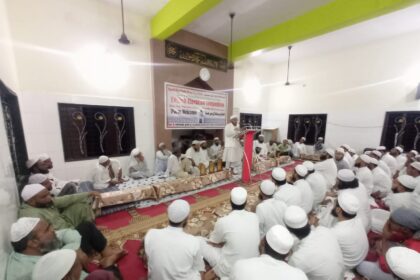By: Mufti Jaseemuddin Qasmi
The writer is lecturer at Markazul Ma’arif Education & Research Centre (MMERC), Mumbai and Co-ordinator Online Darul Ifta
Eitikaf is a full submission to Allah’s will staying in His home for seeking his forgiveness and pleasure and searching for espeacial night ‘Lailatul Qadr’.
Eitikaf is a continuous practice of prophet Muhammad (saws) as Hazrat Aisha Siddiqa (ra) says: “The Prophet used to practice I`tikaf in the last ten days of Ramadan till he died and then his wives used to practice I`tikaf after him”.[Sahih Al-Bukhari 2026]
I’tikaf in ten days of Ramzan is Sunnat-e-Muakkadah and Kifayah which means that if it is a small village, it is necessary that there would be at least one person in I’tikaf for last ten days of Ramzan. And if it is a city then one person at least must be in I’tikaf in every ward of the city. If nobody is in I’tikaf then every one of village and the people of the ward of the city will be sinful.
Eitikaf is a very virtuous deed in the sight of Allah Almighty. I’tikaf of ten days in Ramzan is equal to two Hajj and two Umrah. [Shuabul Iman-3681]
The Messenger of Allah (saw) said concerning the person observing I’tikaf. “He is refraining from sin and he will be given a reward like that of one who does all kinds of good deeds.”[Ibne Maja-1781] It means there are some kinds of worship that the person in Itikaf cannot do such as participating in funeral prayer or attending to the sick people but without doing them, he gets the reward of those deeds when he is in I’tikaf.
Some Rulings about Eitikaf
- The person who is in I’tikaf is not allowed to go out of the mosque without any unavoidable human need such as answering a natural call, wajib bath, wajib wudhu. If Mutakif will go out of the mosque without any basic need intentionally or unknowingly, he will lose his I’tikaf and he should keep qaza I’tikaf later. Ummul Mumineen Aisha Siddaqa (ra) says about the Eitikaf of prohet (saws) “When the Messenger of Allah (may peace be upon him) was in I’tikaf, he inclined his head towards me and I combed his hair, and he did not enter the house but for the natural calls (for relieving himself).” [Muslim-297]
- On twentieth of Ramzan the Mutakif should enter the mosque before Maghrib and after seeing the crescent of Shawwal, he may come out of the mosque.
- To go out of the mosque to take bath just for getting cool after bathing for performing Friday salah is not allowed.
- If anyone had the intention that during I’tikaf he will go out of the mosque for some work such as tarawih etc then he may go out and his I’tikaf will not be affected by this.[Aalamgir]
- In I’tikaf to remain silent with the intention that it is a deed of divine reward is makrooh. Nevertheless one should avoid unnecessary talk.
- If someone is in I’tikaf in the masjid where Friday prayer is not performed then he would go to nearby masjid for Friday prayer and he may come out of his masjid at a time that he may perform sunnah salah in that Juma masjid and listen to Friday sermon.
- Women also can perform I’tikaf with the permission of their husbands. They will do I’tikaf in the place where they perform daily salah in the home and without any necessary need they cannot go out of that place to the other parts of the home or else their I’tikaf will be broken. [Fatawa Alamgiri]
Shab-e- Qadr- a night better than thousand months
Shab-e Qadr is the most important night in the sight of Allah. Due its extraordinary significance, Allah the Almighty, revealed one complete surah in the importance of this glorious night as the Holy Quran reads:
“Indeed, We sent the Qur’an down during the Night of power.
And what can make you know what the Night of power is?
The Night of power is better than a thousand months.
The angels and the Spirit descend therein by permission of their Lord for every matter. Peace it is until the emergence of dawn.” [Surah Al-Qadr]
The beloved messenger of Allah describes its virtues:
“Whoever fasted the month of Ramadan out of sincere Faith (i.e. belief) and hoping for a reward from Allah, then all his past sins will be forgiven, and whoever stood for the prayers in the night of Qadr out of sincere Faith and hoping for a reward from Allah, then all his previous sins will be forgiven.” [Al-Sahih Al-Bukhari-1901]
Anas bin Malik said: “Ramadan began, and the Messenger of Allah (saw) said: ‘This month has come to you, and in it there is a night that is better than a thousand months. Whoever is deprived of it is deprived of all goodness, and no one is deprived of its goodness except one who is truly deprived.” [Sunan Ibn Majah -1644]
Which night is Lailatul Qadr:
Aisha Siddiqa (May Allah be pleased with him) narrates that Allah’s Apostle said, “Search for the Night of Qadr in the odd nights of the last ten days of Ramadan.” [Sahih Al-Bukhari- 2017]
Another Hadith reads: “Allah’s Apostle went out to inform the people about the (date of the Night of decree (Al-Qadr). There happened to be a quarrel between two Muslim men. The Prophet said, “I came out to inform you about the Night of Al-Qadr, but as so-and-so and so-and-so quarrelled, so the news about it has been taken away; and may be it was better for you. So look for it in the ninth, the seventh, or the fifth (of the last ten days of Ramadan). [Sahih Al-Bukhari -49]
Here in the above hadith odd nights mean 21, 23, 25, 27, 29th nights of Ramzan.
Since Allah Almighty gave the people of this ummah shorter lives in comparison with previous ummahs that is why Allah Almighty by his grace blessed them to make up for their short lives.
This above mentioned hadith gives us a lesson, that is, the quarrel causes, oftentimes, deprive mankind of many virtues of Allah.
In fact, this virtuous night can be in any night of of the year. Allah Almighty did not point out this night due to His abounding wisdom and as Allah’s beloved apostle says in the above mentioned hadith it seems Allah Almighty intended khair and betterment for Muslims by hiding it. To take an example, those who really wish to get this month’s virtues gets taufeeq to worship in many nights in the search of this bounteous night. And also if this night had been confirmed and still any unlucky person would have dared to commit a sin then it was quite possible that Allah Almighty would have visited any divine punishment on him.
In which night Shab-e- Qadr is expected the most? In the light of various ahadith, scholars of Islam have different opinions in this regard. Nevertheless, the majority of the scholars say in 27th night of Ramzan it is expected the most.
In these all five nights we should worship as much as possible remaining awake the whole night by performing nafl salah, reciting the holy Quran, doing zikr and seeking forgiveness from sins. If someone is not able to awake the whole night at least he should be awake as much as he can being engaged in worship and then sleep and perform Fajr salah with congregation. And none should be deprived of blessings in this night.
Sadaqah Fitr:
Ibn `Umar (ra) says Allah’s Apostle (saws) made it incumbent on all the slave or free Muslims, male or female, to pay one Sa’a of dates or barley as zakatulfitr.
Sadqafitr is obligatory upon every Muslim who is sane and adult on behalf of him and his offspring who has not come of age.
Sadqafitr is one Sa’a date, raisin, cheese or half Sa’a wheat (Sa’a is equal to 3.180 gm)
Though sadaqafitr is obligatory only on those who possess the prescribed amount for zakat but the poor people also should pay it, because Allah’s messenger (saws) said that sadqafitr removes the shortcomings that occurred in the fast. And no doubt rich and poor both need the purification of their fast.
According to hadith, the second purpose of this alms is feeding poor. That means on the happy occasion of Eid, poor people should also enjoy delicious food. So, Muslims should pay Sadaqa Fitr in a way that poor people could make their ends meet by rich Muslim’s help. Hence, they should pay by raisin or other costly object and they should not be confined to the wheat always which is cheapest grain nowadays.
How to Perform Eid Prayer:
The Eid Prayer has two rak’ah to perform in the normal way, with the only addition of six takbirs, three of them in the beginning of the first rak’ah, and three of them just before ruku’ in the second rak’ah. The detailed way of performing the ‘Eid prayer is as follows:
The Imam will begin the prayer without Adhan or Iqamah. He will begin the prayer by reciting takbir of Tahrimah (Allahu Akbar). You should raise your hands up to the ears, and reciting the takbir, you give a little pause during which you should recite Thana’ (Subhanak Allahumma…….)· After the completion of Thana’ the Imam will recite takbir (Allahu Akbar) three times, and after reciting each Takbir (Allahu Akbar) in a low voice, you should bring your hands down and leave them earthwards. But, after the third takbir, you should set them at the level of your navel as you do in the normal prayer.
After these three takbirs the Imam will recite the Holy Qur’an, which you should listen quietly. The rest of the rak’ah will be performed in the normal way.
After rising for the second rak’ah, the Imam will begin the recitations from the Qur’an during which you should remain calm and quiet. When the Imam finishes his recitation, he will recite three takbirs once again, but this time it will be before bowing down for ruku’. At each takbir you should raise your hands up to the ears.



